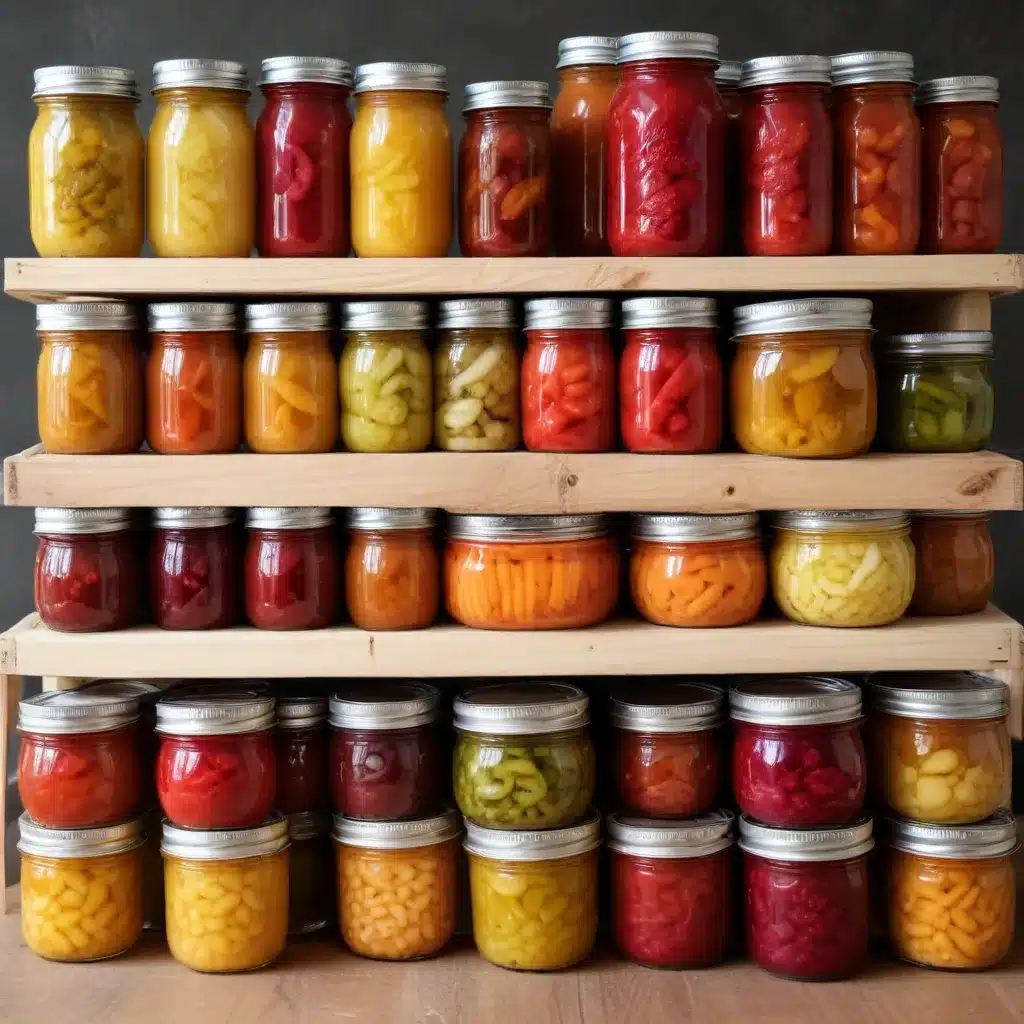
As the summer sun wanes and the nights grow cooler, the bounty of Crooked Pines Farm bursts forth in a vibrant display. Rows of ripe tomatoes, crisp peppers, and leafy greens beckon to be savored, but with such abundance, the question arises: how can we preserve this harvest to enjoy throughout the year? Fortunately, there are several time-tested methods to capture the flavors of summer and ensure our pantries and freezers remain well-stocked.
Canning: Sealing in Summer’s Flavors
Canning is a classic technique that allows you to safely store a wide range of produce, from acidic tomatoes to low-acid vegetables. The process involves submerging jars of food in boiling water or a pressurized environment to eliminate harmful microbes and create a shelf-stable product.
When selecting produce for canning, it’s important to choose unblemished, ripe fruits and vegetables at the peak of freshness. For acidic foods like tomatoes, a simple water bath canning method can be used, where jars are submerged in boiling water for a specified duration. Pressure canning, on the other hand, is required for low-acid foods such as corn, green beans, and meats, as it reaches the high temperatures needed to destroy botulism spores.
Proper canning technique is essential for food safety, so it’s wise to consult resources like the USDA’s Complete Guide to Home Canning or take a local canning class. Investing in the right equipment, such as a reliable pressure canner and jar lifter, will also ensure a successful canning experience.
Fermentation: Harnessing Microbial Magic
While canning eliminates undesirable microorganisms, fermentation embraces them, allowing beneficial bacteria to transform fruits and vegetables into delectable, probiotic-rich delicacies. This ancient preservation method not only extends the shelf life of produce, but also enhances its nutritional value and unique flavors.
The fermentation process involves submerging chopped or whole produce in a brine solution, often with the addition of salt or whey. Over time, lactic acid-producing bacteria multiply, creating an anaerobic environment that inhibits the growth of harmful microbes. The result? Tangy, crunchy sauerkraut, zesty kimchi, or punchy hot sauce.
Beginners can start with simple ferments like pickled cucumbers or sauerkraut, closely monitoring the process to ensure proper pH levels and preventing mold growth. More adventurous fermenters may explore options like lacto-fermented hot sauce or kraut-style fermented greens. Sandor Katz’s classic text, The Art of Fermentation, is an invaluable resource for understanding the science and art of this ancient preservation method.
Dehydration: Nature’s Pantry Preservation
While canning and fermenting excel at preserving the flavors and textures of fresh produce, dehydration offers a unique approach that can extend the shelf life of your harvest for years. By removing the moisture content from fruits, vegetables, herbs, and even meats, dehydration creates a stable, shelf-stable product that can be easily stored and reconstituted.
Dehydration can be achieved through a variety of methods, from the simplicity of sun-drying to the precision of electric food dehydrators. When preparing produce for dehydration, it’s important to slice or chop items evenly to ensure consistent drying. Blanching certain vegetables can also help preserve their color and nutrient content.
Dehydrated foods can be enjoyed as snacks, incorporated into cooking, or even ground into powders for seasoning. Dried herbs, spices, and vegetable powders make excellent pantry staples, while dehydrated fruits and jerky provide satisfying, shelf-stable treats. For long-term storage, dehydrated goods can be packed in airtight containers or sealed bags to prevent moisture and oxygen exposure.
Seasonal Considerations
Summer’s Bounty
As the warm summer months reach their peak, the gardens at Crooked Pines Farm overflow with juicy tomatoes, vibrant peppers, and abundant leafy greens. This is the ideal time to preserve the essence of summer through canning, fermenting, and dehydrating.
Canning tomatoes is a time-honored tradition, whether preserving them whole, crushed, or transformed into sauces and salsas. Similarly, hot and sweet peppers can be canned or fermented into spicy condiments that will brighten up winter meals. Leafy greens like kale and Swiss chard can be quickly blanched and frozen, retaining their nutritional value and fresh flavors.
Embracing the Harvest
As the seasons change and the garden shifts towards cooler-weather crops, the preservation techniques at Crooked Pines Farm adapt accordingly. Root vegetables like carrots, beets, and parsnips can be dehydrated into flavorful chips or powders, while winter squashes and garlic can be stored in a cool, dry place for months.
Fermentation also shines in the fall, with the creation of sauerkraut, kimchi, and other probiotic-rich pickles that pair perfectly with hearty stews and roasted meats. Dehydrating herbs and spices at the end of the growing season ensures a well-stocked pantry for the coming year.
Food Safety and Community
Throughout the preservation process, it’s crucial to maintain strict food safety protocols. Sterilizing equipment, handling produce with care, and ensuring proper storage conditions are all essential steps to prevent the growth of harmful microorganisms and ensure the long-term quality of your preserved goods.
At Crooked Pines Farm, we believe in the importance of community and tradition when it comes to preserving the harvest. We regularly host preservation workshops where families can learn time-honored techniques, share recipes, and connect with like-minded individuals who value the art of putting up the season’s bounty. By passing on these skills and celebrating the rich history of food preservation, we hope to inspire the next generation of homesteaders and self-reliant gardeners.
Whether you’re canning your first batch of tomatoes, fermenting your inaugural jar of sauerkraut, or dehydrating a bountiful harvest, the team at Crooked Pines Farm is here to guide you on your preservation journey. By embracing these time-tested methods, you can savor the flavors of summer, nourish your family with the abundance of the land, and cultivate a deep appreciation for the cycles of nature. Happy preserving!


